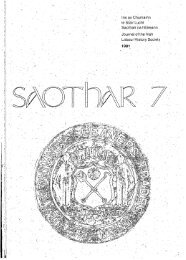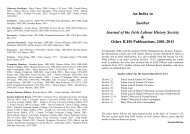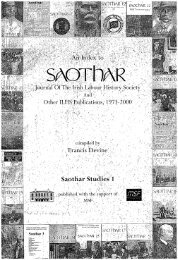You also want an ePaper? Increase the reach of your titles
YUMPU automatically turns print PDFs into web optimized ePapers that Google loves.
82 SAOTHAR 13Tory Party? '8 This sense of the party's radical roots is one that is encouraged by the party itSelf. CharlesHaughey in 1974 reminded Dublin members that FF had come to power as a radical party;'At that time, Fianna Fail was looked upon by certain sectors as a troublesome, even dangerous arrival onthe scene. It represented a threat to the established order of things. That the established order includedslums, chronic unemployment, subsistence level farming and primitive health services, did not deter themfrom condemning Fianna Fail for wanting to upset it. '9Haughey was here reiterating a view of the party's history which had been established by Eamonde Valera. Mair quotes an interview given by de Valera in 1976 in which he claimed that in the earlyyears of the party he was worried that it was being perceived as too oriented towards the working class;'In those days I believe we could be called socialists, but not communists' .10 Indeed de Valera was notabove calling up the ghost of James ConnoUy at crucial junctures at this time. The left in Ireland maywell have underestimated the party's continuing ability, down to Haughey 's denunciation of the 1982-87 Coalition government's 'Thatcherism', their support by a reactionary clique of monetarist economistsand his own affiliation to Keynes, 'the last economist worth his salt'!1, to maintain a populist,radical appeal. .But it would be seriously to underestimate de Valera's own shrewd evaluation of the balance ofpolitical forces in the Free State to take him at his word on these issues. A better insight into his realcalculations is given in a letter to Joseph McGarrity, the leading Clan na Gael figure in the USA. It waswritten after the extraordinary Sinn Fein Ard Fheis in 1926 and the subsequent decision to create thenew party. Justifying this decision de Valera provided an interesting evaluation of the political situationin the Free State:'You will perhaps wonder why I did not wait any longer. It is vital that the Free State be shaken at the ,nextgeneral election, for if an opportunity be given it to consolidate itself further as an institution -if the presentFree State members are replaced by Farmers and Labourers and other class interests, the national interestas a whole will be submerged in the clashing of rival economic groups. '12The failure of abstentionism as a tactic after the Civil War has been ably documented by Pyne. 13 Butclearly de Valera was not simply concerned with Sinn Fein' s inability to hold onto its constituency, Theletter demonstrates a real fear that despite the limitations on, and truncated nature of, the independenceof the Free State, an early prediction of ConnoUy's about the progressive effects of self-governmentmight be materialising: .'An Irish Republic would be ... the natural repository of popular power; the weapon of popularemancipation, the only power which would show in the full light of day all those class antagonisms andlines of economic demarcation now obscured by the mists of patriotism. '14The end of 'Civil War politics' is something which has been often proclaimed since the 1960s, withthe Progressive Democrats being the latest in a long line of would-be realigners, more usually from theleft. Ironically it was de Valera, too often portrayed as a man of illusions and dreams, who clearheadedlyperceived that the Civil War fissure, though a deep and bitter one, would not inevitablyreproduce itself as the fundamental alignment in Irish politics.Although the division in the leadership of Sinn Hin over the Treaty had no crucial social oreconomic dimension to it, despite the clear reliance of the anti-Treatyites on the small farmers of thewest and the support for the Treaty of large farmers and the financial and mercantile bourgeoisie, theramshackle lumber room of Sinn Fein social policies would be visited increasingly by de Valera andhis lieutenants in the post Civil War years. This was, in part, a response to Cumann na nGaedheal'sevolution as party of government, an evolution which in itself helped to 'socialise' the Civil Wardivision. The Army Mutiny and the secession from the party of a group which constituted itself as Clann





